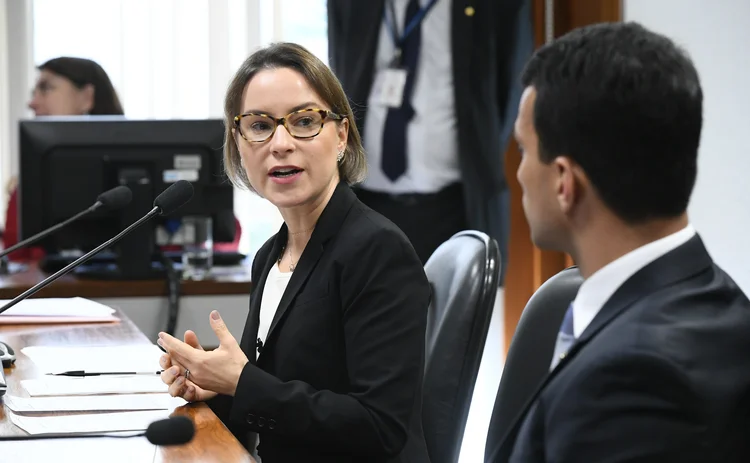
People: Central Bank of Brazil deputy governor resigns
Jens Weidmann gets new term at BIS; Rwanda appoints deputy; and more

Brazil: The Central Bank of Brazil’s deputy governor Fernanda Nechio is resigning early, it announced on March 18. In an official statement, governor Roberto Campos Neto said her resignation was due to personal reasons.
The announcement came a day after the central bank increased interest rates by 75 basis points to 2.75%. It was the first rate hike in six years, and the first among G20 central banks in 2021.
Nechio is expected to finish her term in office after the next monetary policy meeting on May 5, or sooner, the central bank said.
Campos Neto publicly recommended economist Fernanda Magalhães Rumenos Guardado to replace Nechio. Guardado has been the chief economist at Banco Bocom BBM since 2019. She holds a bachelor’s degree, a master’s and a PhD in economics from Pontifical Catholic University of Rio de Janeiro.
According to the recently approved central bank law, both the senate and president Jair Bolsonaro are required to confirm Guardado’s appointment before May 4.
Basel: On March 10, the Bank for International Settlements (BIS) announced the re-election of Deutsche Bundesbank president Jens Weidmann as chair of its board of directors.
Weidmann will start his third three-year term in the post in November 2021. The president of the German central bank first assumed this position on November 1, 2015.
The BIS board of directors is responsible for determining the strategic and policy direction of the institution. It also supervises its management. The 18-member body meets at least six times a year.
This body counts six ex officio directors, who are the governors of the central banks of Belgium, France, Germany, Italy, the UK and the US. Currently, other directors are the governors of the central banks of Brazil, India, Japan, Mexico, Sweden, Switzerland and the Netherlands.
Rwanda: Rwanda’s president Paul Kagame appointed a new deputy governor at the central bank on March 15, according to local newspaper, The New Times.
Soraya Hakuziyaremye will replace Monique Nsanzabaganwa at the National Bank of Rwanda, after the latter was appointed deputy chair of the African Union Commission in February.
Hakuziyaremye has been serving as minister of trade and industry since October 2018. Before that she had been vice-president of financial institutions and financial markets risk management for Dutch financial group ING in London.
The new deputy governor holds a master’s degree in finance and marketing from the Solvay Business School of Université libre of Brussels. Hakuziyaremye holds a certificate of advanced studies in international management from the Thunderbird School of Global Management of Arizona State University.
Costa Rica: Two former governors of the Central Bank of Costa Rica died over the weekend of March 20–21. On March 20, Bernal Jiménez, the bank’s governor between 1973 and 1977, died at the age of 91.
Jiménez served in multiple roles in the central bank, executive and legislature. Prior to serving as governor, he had been a member of the bank’s board between 1957 and 1960.
Jiménez held three ministerial portfolios in the 1960s, including a stint as finance minister (1964–65). He was a member of the Legislative Assembly for the centre-left National Liberation Party, serving as president of the assembly from 1984 to 1985. He served as the party’s president between 2010 and 2015.
Carlos Revilla Maroto, an editor at Cambio Político, described Jiménez as a “convinced Keynesian economist” and a “social-democratic lighthouse”.
On March 21, Francisco de Paula Gutiérrez, another former governor of the Costa Rican central bank, died. Gutiérrez led the central bank between 2002 and 2010. Prior to this, he served as finance minister (1996–98). Gutiérrez was also a member of the National Liberation Party; however, the government of conservative Abel Pacheco named him central bank chief.
Under Gutiérrez, the central bank first introduced a policy rate in 2004. The BCCR introduced a currency-band regime under Gutiérrez in 2006, which allowed the colón to float relative to the US dollar.
In its tribute posted to its Twitter account, the central bank credited Gutiérrez with commencing “the transition towards the current regime of inflation targeting and steering the country on a course to an era of low inflation”. IMF figures show inflation declined from 9.2% in 2002 to 5.7% in 2010.
Gutiérrez was also a professor of economics and finance at the INCAE Business School. He did his master’s and doctoral work at the University of Pennsylvania.
Only users who have a paid subscription or are part of a corporate subscription are able to print or copy content.
To access these options, along with all other subscription benefits, please contact info@centralbanking.com or view our subscription options here: http://subscriptions.centralbanking.com/subscribe
You are currently unable to print this content. Please contact info@centralbanking.com to find out more.
You are currently unable to copy this content. Please contact info@centralbanking.com to find out more.
Copyright Infopro Digital Limited. All rights reserved.
You may share this content using our article tools. Printing this content is for the sole use of the Authorised User (named subscriber), as outlined in our terms and conditions - https://www.infopro-insight.com/terms-conditions/insight-subscriptions/
If you would like to purchase additional rights please email info@centralbanking.com
Copyright Infopro Digital Limited. All rights reserved.
You may share this content using our article tools. Copying this content is for the sole use of the Authorised User (named subscriber), as outlined in our terms and conditions - https://www.infopro-insight.com/terms-conditions/insight-subscriptions/
If you would like to purchase additional rights please email info@centralbanking.com
Most read
- ECB staff speak out against changes to internal survey
- Central bank of the year: Central Bank of Brazil
- French president calls for expanded ECB mandate







